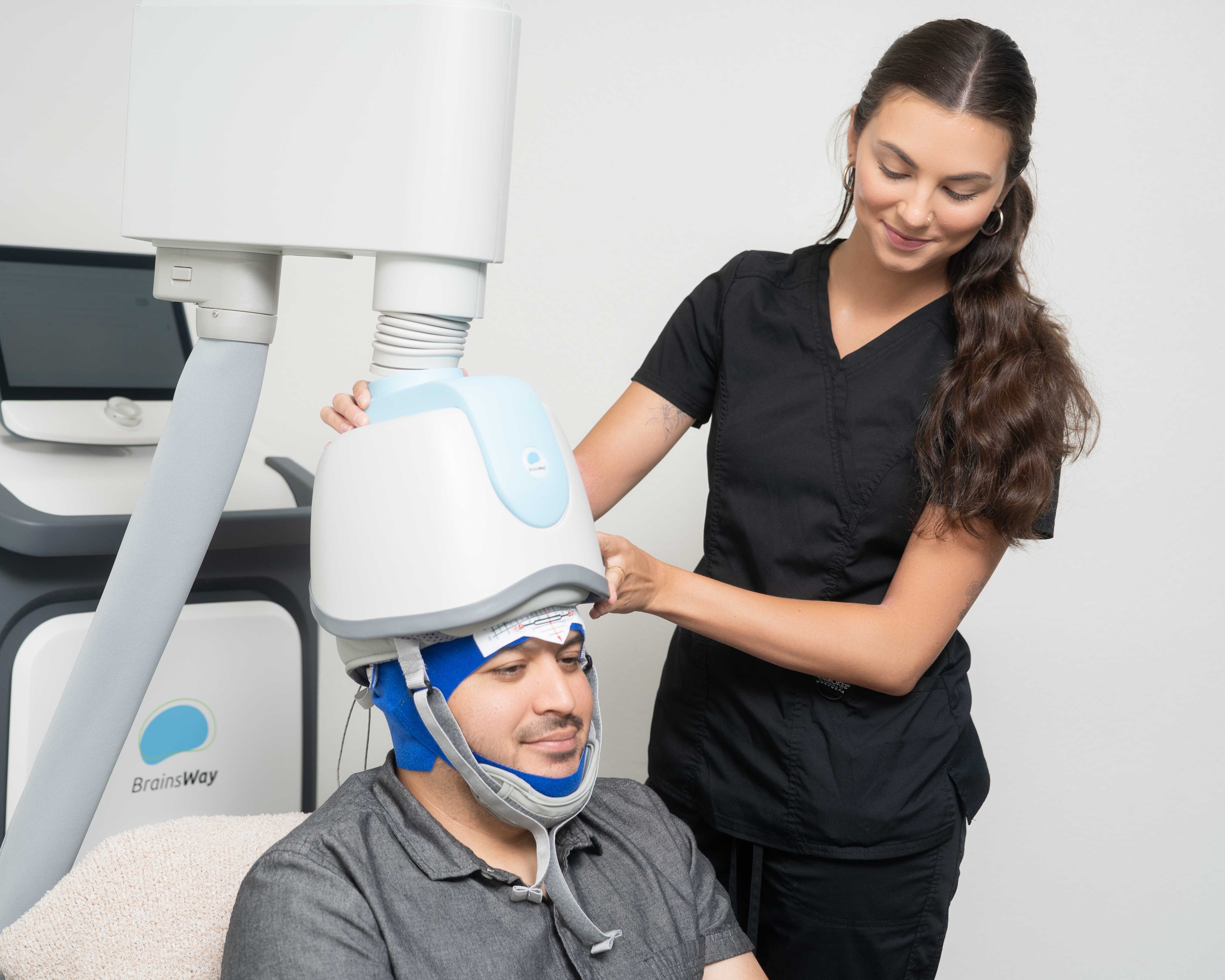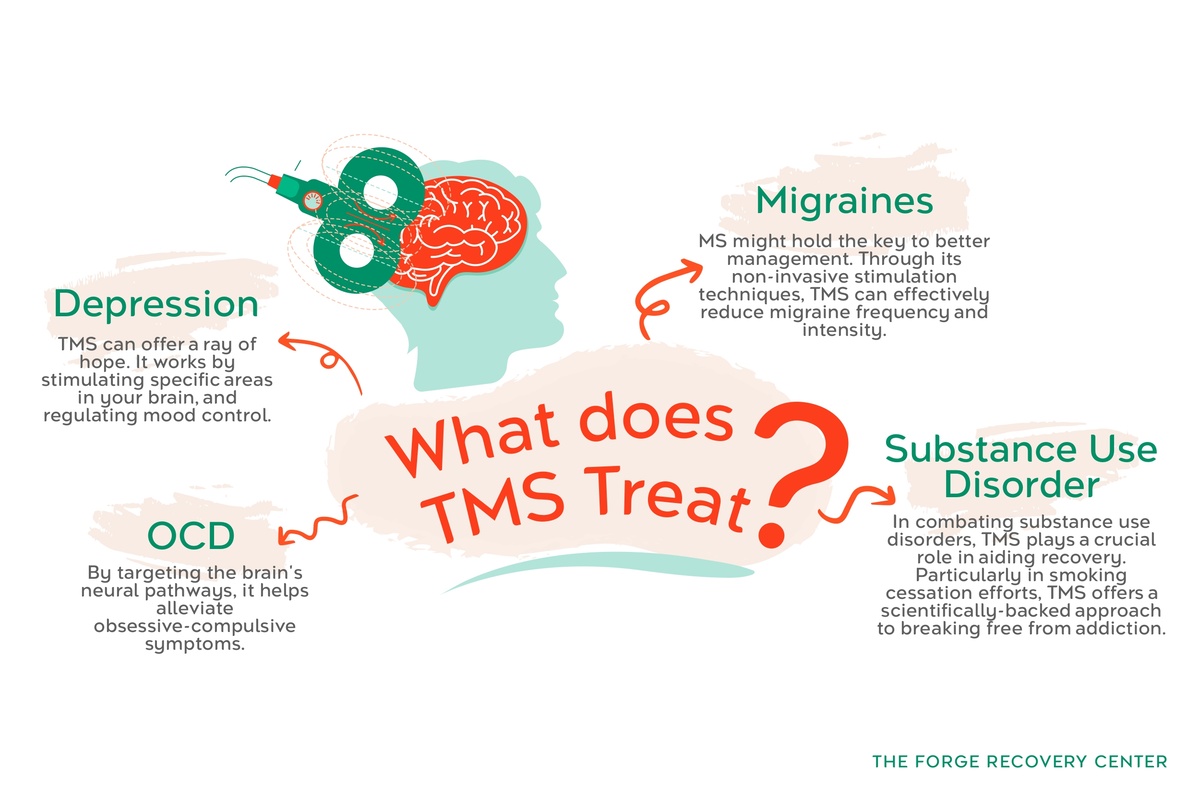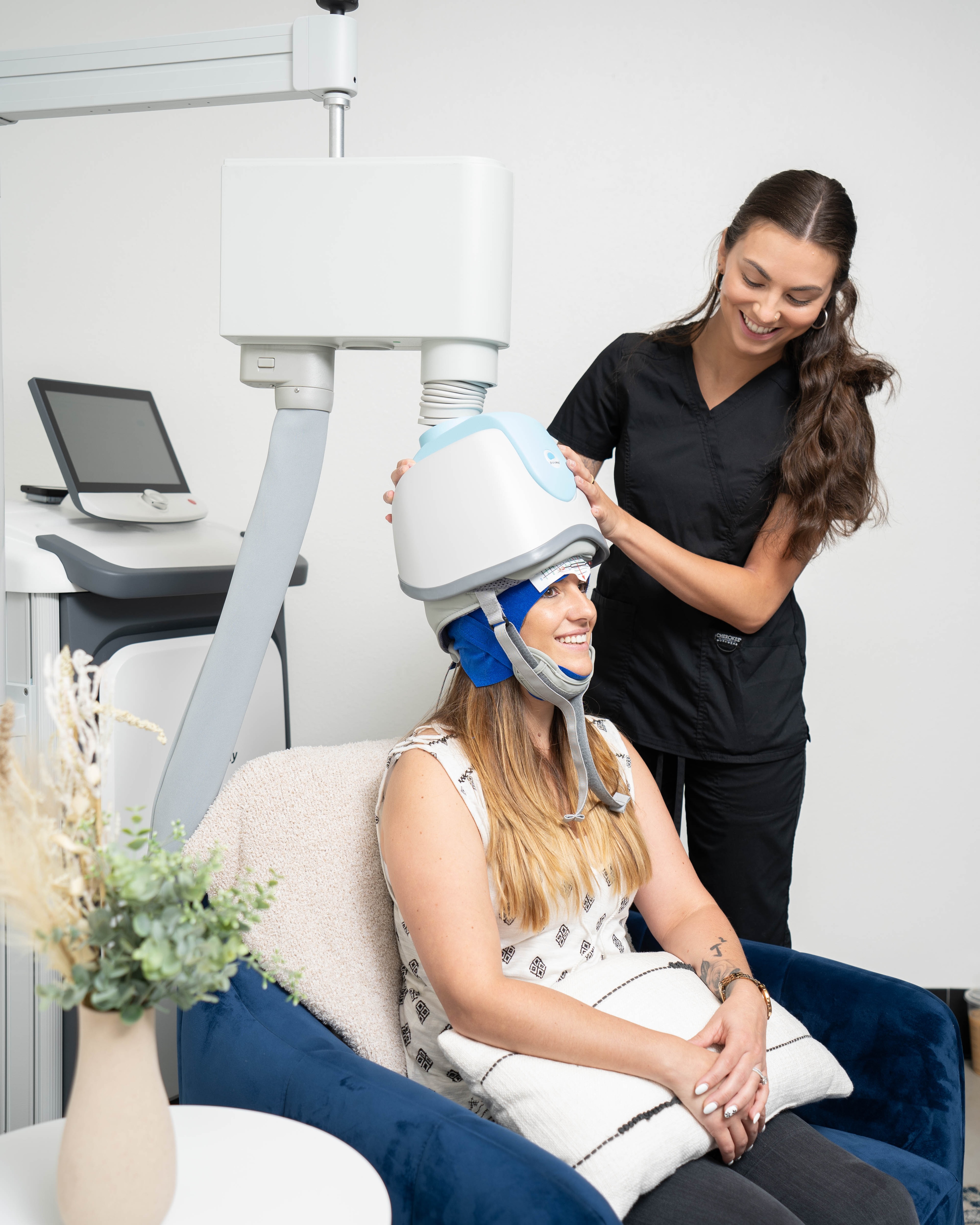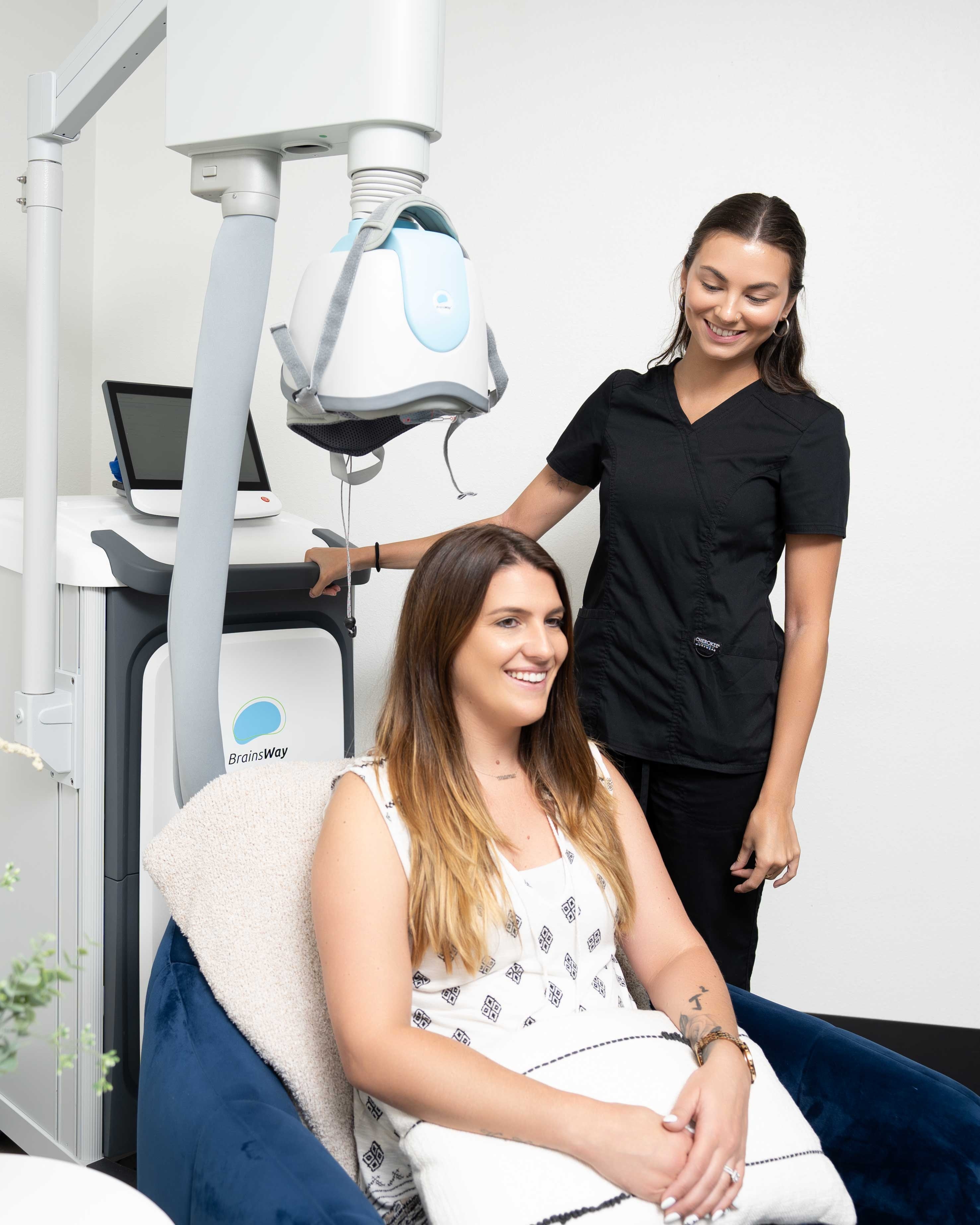TMS: Your Guide to Treatment, Benefits, & What to Expect


Transcranial magnetic stimulation (TMS) is a promising approach to treating depressive disorders, OCD, and substance addiction. It works by using magnetic fields to stimulate nerve cells in the brain, fostering improved mental health. Explore the transformative power of TMS and its workings — and if you or a loved one could benefit from TMS therapy, don’t hesitate to call The Forge Recovery Center to learn more about next steps.
What Is TMS?
Transcranial magnetic stimulation (TMS) is a non-invasive procedure that uses magnetic fields to stimulate nerve cells in the brain. It is an FDA-approved therapy for certain mental health conditions, such as major depressive disorder and obsessive-compulsive disorder. During a TMS session, an electromagnetic coil is placed against the scalp near the forehead, and short magnetic pulses are delivered to targeted areas of the brain. These pulses can help regulate mood and alleviate symptoms of depression or other disorders.
TMS is typically used when other treatments, such as medication or therapy, have not been effective, offering a promising alternative for individuals seeking relief from mental health challenges.
An FDA-Approved Modality
When it comes to TMS, understanding its FDA approval is crucial for ensuring its safety and effectiveness. FDA approval signifies that the treatment has undergone rigorous testing to validate its benefits and risks. This approval assures you that the therapy meets high standards of quality and efficacy.
The FDA approval process involves a thorough evaluation of clinical trial data, ensuring that TMS is both safe and effective for specific conditions. For instance, TMS is FDA-approved for treating major depressive disorder in individuals who have not responded well to other treatments.
In considering the conditions for which TMS is FDA-approved, it's essential to recognize that this approval indicates the therapy's suitability for addressing certain mental health challenges. The approval underscores the therapy's credibility and reliability in managing specific conditions effectively.

Conditions Treated by TMS
TMS primarily treats depressive symptoms but also has the potential to treat OCD, severe migraines, and even substance use disorders. Here’s an overview of conditions that TMS primarily treats:
Depression
When struggling with depression, TMS can offer a ray of hope. It works by stimulating specific areas in your brain, and regulating mood control. Typically, TMS is considered when other treatments like therapy or medication haven't provided the desired relief.
OCD
For individuals battling OCD, TMS emerges as a promising treatment avenue. By targeting the brain's neural pathways, it helps alleviate obsessive-compulsive symptoms. Those with OCD may benefit from reduced anxiety levels and improved daily functioning through TMS. When traditional therapies fall short, turning to TMS for managing OCD could be a viable option.
Migraines
Suffering from debilitating migraines? TMS might hold the key to better management. Through its non-invasive stimulation techniques, TMS can effectively reduce migraine frequency and intensity. Consider exploring TMS when conventional migraine treatments prove ineffective or insufficient in providing relief.
Substance Use Disorders
In combating substance use disorders, TMS plays a crucial role in aiding recovery. Particularly in smoking cessation efforts, TMS offers a scientifically-backed approach to breaking free from addiction. When traditional methods struggle to curb substance abuse, integrating TMS into your treatment plan could mark a turning point toward recovery.
Are You Struggling with Mental Health or Addiction?
We Can Help. Call Us Now!
CALL: 877-839-1772
How Does TMS Work?
TMS therapy works in three stages: preparation, session, and follow-up. Let’s explore these stages further:
Stages of TMS Therapy
Preparation
Before your TMS session, it's crucial to follow specific preparation steps. You may be advised to avoid caffeine or certain medications before treatment. Ensure you have a clear understanding of these instructions to optimize the session.
To prepare for your TMS treatment, make sure you arrive on time and are well-rested. It's essential to communicate any concerns or questions with the healthcare provider beforehand. Following these preparation steps can enhance the effectiveness of the treatment.
Session
During a TMS session, you will be comfortably seated in a chair while a magnetic coil is placed against your head. The coil delivers focused magnetic pulses to stimulate nerve cells in the brain. Each session typically lasts between 20 to 40 minutes.
The procedure of receiving TMS treatment is painless and non-invasive. You may hear clicking sounds and feel tapping sensations on the scalp during the session. Most patients undergo sessions five times a week for several weeks, depending on the treatment plan prescribed by the healthcare provider.
Follow-Up
After completing your TMS sessions, follow-up appointments are essential for monitoring progress and addressing any concerns. During these visits, healthcare providers assess your response to treatment and make any necessary adjustments. Consistent follow-up care plays a vital role in ensuring the long-term success of TMS therapy.
Regular follow-up appointments allow healthcare providers to track your progress and provide additional support if needed. It's important to attend all scheduled follow-up visits to maximize the benefits of TMS treatment and address any emerging issues promptly.
A Non-Invasive Procedure
TMS is considered a non-invasive procedure because it does not require surgery or anesthesia. This means that you can undergo treatment without the risks associated with invasive procedures such as infections or complications from anesthesia.
The benefits of non-invasive treatments like TMS include minimal side effects, shorter recovery times, and lower risks compared to invasive procedures. By opting for non-invasive therapies, patients can experience effective treatment outcomes with reduced discomfort and downtime.
TMS differs from invasive procedures by targeting specific areas of the brain using magnetic pulses instead of surgical interventions. This targeted approach allows for precise stimulation of neural pathways without affecting surrounding brain tissue.
What Is rTMS?

Repetitive Transcranial Magnetic Stimulation (rTMS) involves delivering multiple magnetic pulses to targeted areas of the brain over time. rTMS differs from other forms of TMS by its repetitive nature, which aims to modulate brain activity more effectively.
rTMS plays a significant role in TMS treatment by providing sustained stimulation to specific brain regions associated with mood regulation and cognitive function. This repetitive stimulation helps normalize neural activity patterns and improve symptoms related to various mental health conditions.
Post-TMS Treatment
TMS treatment has both immediate effects and potential side effects to be aware of. Follow-up care is also a crucial part of the post-therapy process. Here’s an overview of post-TMS considerations to keep in mind once treatment has concluded:
Immediate Effects
After a TMS session, you may experience mild side effects like headache or scalp discomfort. These effects typically subside shortly after the session. Results from TMS treatment may vary, but some patients notice improvements within a few weeks.
Follow-Up Care & Support
Follow-up care and support are crucial for maximizing the benefits of TMS treatment. Your healthcare provider will monitor your progress and adjust the treatment plan as needed. They play a vital role in ensuring that you receive ongoing care and support post-TMS.
Potential Side Effects
Common side effects of TMS include scalp discomfort and mild headaches. To manage these, your healthcare provider may recommend over-the-counter pain relievers. If you experience persistent or severe side effects, it is important to seek medical attention promptly.
Risks Involved
While TMS is generally safe, there are some risks associated with the treatment. Compared to other treatments like medication, TMS carries fewer risks. Rare but serious risks of TMS include seizures, which are extremely uncommon due to careful patient selection and monitoring during treatment.
Are You Struggling with Mental Health or Addiction?
We Can Help. Call Us Now!
CALL: 877-839-1772
The Benefits of TMS Therapy
TMS therapy is a safe, personalized, and targeted experience that’s tailored to your brain activity and current symptoms. Here’s a more in-depth summary of the benefits that TMS offers:
Personalized Treatment
When it comes to personalized treatment, TMS therapy stands out by tailoring the treatment to your specific needs. By evaluating your unique brain activity and symptoms, healthcare providers can create a customized TMS protocol just for you. This individualized approach ensures that you receive the most effective treatment possible.
In TMS therapy, the importance of individualized treatment plans cannot be overstated. By adjusting the stimulation parameters based on your brain's characteristics, such as neural connectivity and activity levels, the treatment becomes more targeted and impactful for you. This personalized touch not only improves outcomes but also minimizes any potential side effects for you.
The effectiveness of TMS therapy is significantly enhanced through personalized treatment. When the therapy is tailored to address your specific neural circuits and areas of dysfunction, it increases the likelihood of achieving positive results. This precision in targeting problem areas within your brain boosts the overall success rate of TMS therapy for you.
Targeted Therapy
TMS therapy excels in providing targeted therapy by precisely stimulating specific regions of the brain responsible for mood regulation and other functions. By honing in on these critical brain areas, TMS can effectively modulate neural activity and restore balance within your brain. This targeted approach enhances the therapeutic benefits of TMS for you.
The precision of TMS in targeting neural pathways sets it apart from other treatments. Through magnetic pulses directed at precise locations in the brain, TMS can influence neuronal activity with remarkable accuracy. This focused stimulation allows for a more refined and effective treatment outcome tailored to meet your unique needs.
One of the key advantages of targeted therapy in TMS is its ability to deliver localized effects without impacting surrounding healthy brain tissue. Unlike systemic treatments that may have broader effects on the body, TMS remains confined to specific brain regions, reducing the risk of unwanted side effects for you.
Effectiveness & Safety
In terms of effectiveness, TMS has demonstrated significant efficacy in treating various mental health conditions such as depression and anxiety disorders. By modulating neural circuits associated with these disorders, TMS can produce lasting improvements in mood and cognitive function for patients like you.
When it comes to safety, TMS offers a favorable profile compared to traditional treatments like medications or electroconvulsive therapy (ECT). With minimal systemic side effects and no anesthesia required during sessions, TMS provides a non-invasive and well-tolerated option for individuals seeking relief from psychiatric symptoms like you.

Starting TMS Treatment
If you’ve attempted multiple treatment options for depression or substance use without success and believe TMS is your answer, it’s important to know what to expect. Below, we’ve shared some preparation tips alongside a glimpse into how your first session will go, the duration of treatment, and post-treatment care.
Preparation Tips
When preparing for TMS treatment, make sure to follow these tips. Prepare yourself mentally by understanding the treatment process and its potential benefits. Arrive well-rested for your sessions to optimize the effectiveness of TMS therapy.
Additionally, avoid consuming caffeine before your sessions as it can interfere with the stimulation process, and be sure to follow any pre-treatment guidelines provided by your healthcare provider diligently to ensure a smooth experience.
Expectations
Your First Session
During your first TMS session, you will undergo a thorough consultation and assessment to tailor the treatment to your needs. This initial session is crucial as it sets the foundation for your entire TMS journey.
Your provider will explain the procedure, address any concerns you may have, and establish a comfortable environment for you. Be open about your expectations and any anxieties you might have.
Length of Treatment
The typical length of a TMS treatment course ranges from 4 to 6 weeks, with sessions scheduled daily on weekdays. Factors like the severity of your condition and individual response to treatment can influence the duration.
Completing the full course is essential for optimal results, so commit to attending all sessions as prescribed by your healthcare team.
During Treatment
Throughout your TMS treatment, you can expect a non-invasive and painless procedure that involves repetitive magnetic pulses targeting specific areas of the brain. While discomfort during sessions is rare, communicate any sensations with your provider for adjustments.
Consistency in attending sessions is key to maximizing the benefits of TMS therapy. Stay engaged in the process and follow through with each appointment for better outcomes.
Post-Treatment
After completing your TMS treatment course, you will transition into post-treatment care where monitoring continues to ensure long-term success. Your healthcare team will assess progress, provide guidance on maintaining results, and offer support as needed.
Ongoing monitoring post-TMS is crucial for tracking any changes in symptoms or overall well-being. Stay connected with your provider even after active treatment ends.

Are You Struggling with Mental Health or Addiction?
We Can Help. Call Us Now!
CALL: 877-839-1772
TMS Success & Statistics
Treatment Outcomes
Patient outcomes with TMS have shown significant improvements in various mental health conditions. There is promising but not quite conclusive evidence that TMS can effectively treat depression, anxiety disorders, and even PTSD.
Studies have also demonstrated that TMS can lead to a significant reduction in symptoms for suicidal individuals who do not respond well to traditional treatments like medication or therapy. In other words, this non-invasive procedure offers hope for those struggling with mental health issues.
Success Rates
When it comes to success rates, research has shown that approximately 50% of patients experience a significant improvement in their symptoms after undergoing a full course of TMS treatment. The effectiveness of TMS varies depending on the individual's condition and response to the therapy.
For individuals with treatment-resistant depression, TMS has been a game-changer, providing relief when other options have failed. Many patients report feeling more energized, motivated, and optimistic after completing their TMS sessions.
Research Data
Recent studies have provided valuable insights into the long-term benefits of TMS therapy. Data suggests that the effects of TMS can be sustained over time, leading to lasting improvements in mood and cognitive function for many individuals.
Moreover, research continues to explore the potential applications of TMS in other psychiatric disorders and neurological conditions. Ongoing studies aim to further enhance our understanding of how TMS works and its role in promoting mental wellness.
Closing Thoughts
In conclusion, understanding the potential of TMS therapy for various conditions is crucial. Knowing how TMS works and its benefits can help you make informed decisions about your treatment. With the success rates and statistics supporting its effectiveness, starting TMS treatment could be a significant step towards improving your well-being. If you or someone you know is struggling with mental health challenges, consider exploring TMS therapy as a viable option for relief. Take charge of your mental health journey and discover the transformative effects of TMS firsthand.
Are You Struggling with Mental Health or Addiction?
We Can Help. Call Us Now!
CALL: 877-839-1772
Are You Ready to Start TMS Treatment? Call The Forge Recovery Center Today!
TMS holds plenty of promise for individuals struggling with mental health disorders and addiction, providing a holistic alternative when other methods fail. If you or someone you care about are facing these challenges and require professional support, The Forge Recovery Center is here for you. Our dedicated team of professionals will conduct an initial evaluation, identify a suitable TMS therapy plan, and accompany you throughout your journey.
Reach out to us today to explore our TMS therapy solutions for mental health and addiction treatment, so that you or your loved one can get the therapy you need and deserve.



